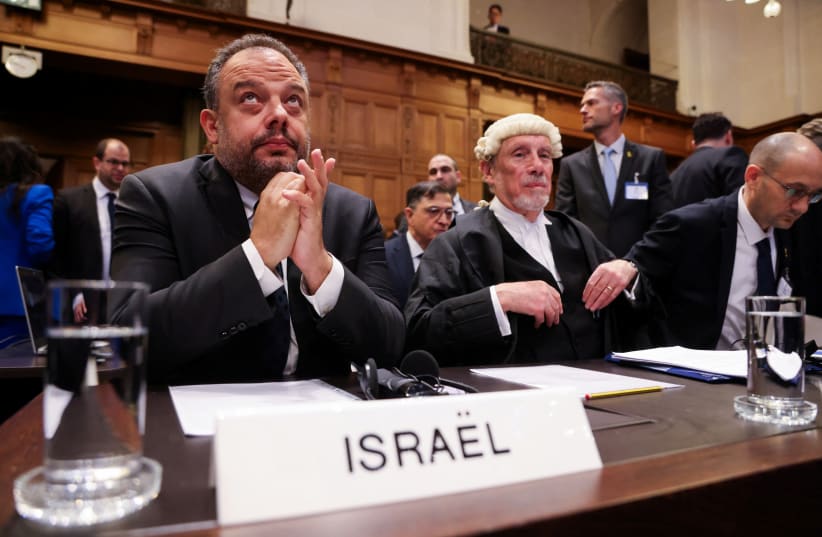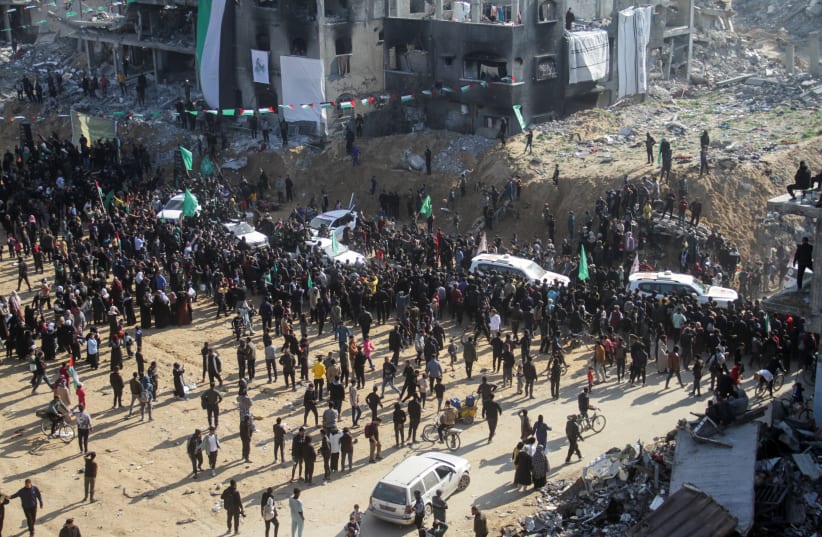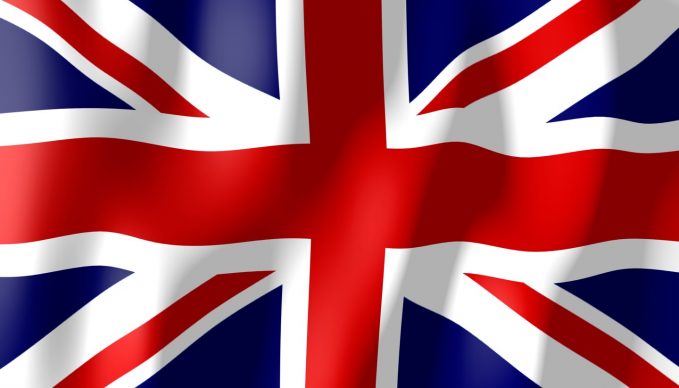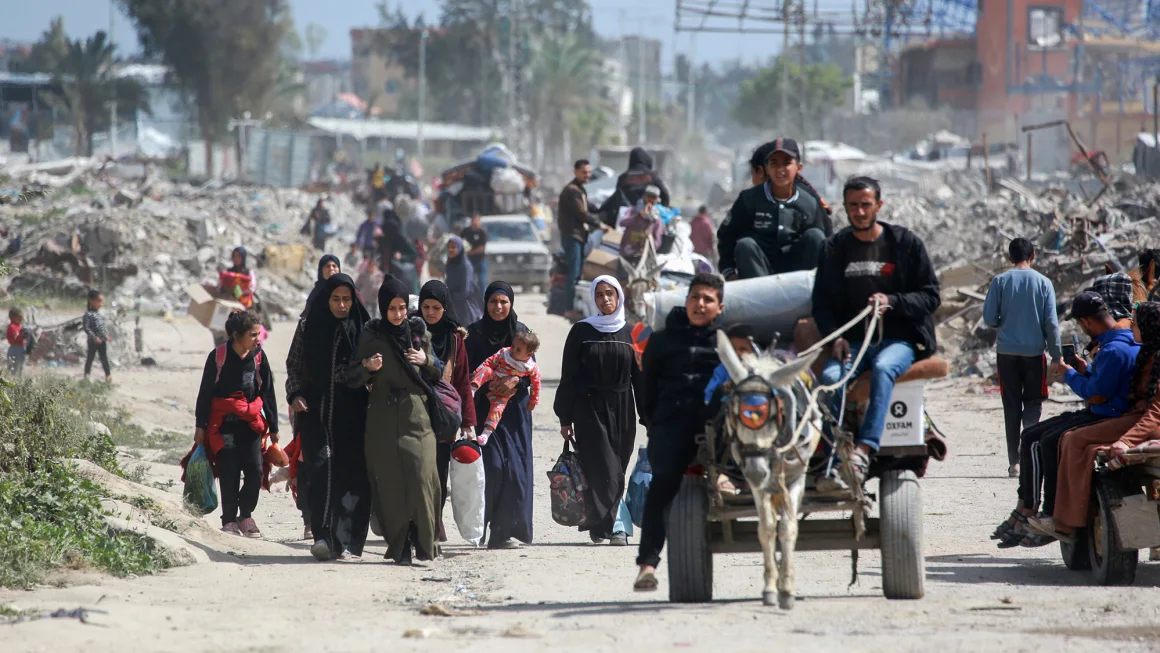Foreign
Israel On Trial Day 2: Israeli defense requests ICJ dismiss South Africa’s genocide charge

South Africa presented their arguments to the court at a three-hour hearing on Thursday in the Hague, the Netherlands.

Legal adviser to Israel’s Foreign Ministry Tal Becker and British jurist Malcolm Shaw sit inside the International Court of Justice
THE HAGUE — Pushing back against South Africa’s complaint at the International Court of Justice, Israel argued on Friday morning that it is Hamas perpetrating genocidal acts, not the IDF.

‘’If there have been acts that may be characterized as genocidal, then they have been perpetrated against Israel,’’ stated Tal Becker, who opened Israel’s defense presentation, adding that ‘’if there is a concern about the obligations of states under the Genocide Convention, then it is in relation to their responsibilities to act against Hamas’s proudly declared agenda of annihilation, which is not a secret, and is not in doubt.’’
A senior Israeli diplomatic source told the Jerusalem Post, ‘’we are confident that the court will understand the reality in Gaza,’’ underlining that Israel has been strictly following international legislation since the launch of the ground operation.
Much like on Thursday, when South Africa presented its case, the court building in the Hague was packed by journalists, including TV crews from across Europe. The court room itself offered a few seats to the public, on the basis of ‘’first come, first served,’’
with some young people actually sleeping outside the courtyard overnight Thursday, just to get a spot. The small, yet remarkably efficient, communication team of only 4 people at the ICJ told the Jerusalem Post they never had to deal with such pressure from the press to assist a hearing.
South Africa’s accusations against Israel
South Africa accused Israel of carrying out genocide in Gaza and has asked the ICJ to issue provisional measures stopping all Israeli military operations in the Strip. On Thursday, South Africa presented its arguments to the court, with an eight-people team that included also the country’s justice minister. Leftwing European politicians such as French Jean-Luc Mélenchon and Britain’s Jeremy Corbyn, alongside Palestinian officials, accompanied the South African delegation, in a clearly political demarche. The Israelis, on the other side, sent to the Hague a purely-legal team, accompanied by a handful of Israeli diplomats handling communications.

PEOPLE LISTEN to the proceedings inside the ICJ yesterday, in The Hague. (credit: THILO SCHMUELGEN/REUTERS)
The historic, two-day hearing has been drawing international attention. Pro-Palestinian activists gathered early Friday morning outside the court, carrying dolls rapped in white cloth stained with red, as if babies injured or killed. Some of the activists carried signs showing a picture of Prime Minister Benjamin Netanyahu next to a picture of Hitler.
Opposing them, with the police separating the two groups, pro-Israeli demonstrators dressed a ‘’Shabbat table,’’ with empty seats for the hostages held in Gaza. Yellow flowers were positioned on the empty plates. The demonstrators carried Israeli flags and signs with pictures of the hostages and of Israelis killed on Oct. 7, underlined by ‘’they cannot testify’’ and singing ‘’Shalom Aleichem.’’ Family members of hostages called on the court to cease immediately the hearings, stressing their distress over the procedure which completely ignores the plight and suffering of the kidnappees.
Israelis host an empty Shabbat table to mark the Israeli hostages still in Hamas captivity outside of the ICJ at the Hague, the Netherlands, January 12, 2024
Israel’s argument at the Hague
Refuting the South African claims, the Israeli team argued that the court has no jurisdiction over this case, as no disputes exist between the country and South Africa. Pretoria claims it had sent to the Israeli embassy numerous requests to discuss the situation in Gaza, but never received a response. British international law expert Malcolm Shaw, who leads the Israeli legal team, argued that South Africa was misleading the court, citing the exact dates of Israeli responses to the diplomatic notes it received, including proposals for meetings between South African and Israeli officials to talk about Gaza.
The Israeli team further argued that claims of genocide fully lack credibility, in view of Israel’s efforts for humanitarian aid to Gaza residents. These efforts include Israel enabling unlimited amounts of fuel, food, water, and medical supplies to be entered into the Gaza Strip.
Doctor Galit Raguan noted that since the beginning of the Israeli military operation, the IDF dropped millions of leaflets with instructions to Gaza residents where they should flee and how they should protect themselves from bombing. 70,000 phone calls were placed by the army to Gazans, with similar explanations, stressing that these moves are in stark contradiction to claims of Israel embracing genocidal policies.
“The applicant astonishingly claims that these efforts are themselves genocidal. A measure intended to mitigate harm to civilians is proof, according to the applicant, of Israel’s intent to commit genocide when it in fact proves the exact opposite,” noted Raguan.
Israel reminded the court that in contrast to its humanitarian efforts, Hamas has been stealing and hoarding the assistance material transferred into the Gaza Strip for the needy. The Israeli legal team also said that the South African complaints ignore in fact all that Hamas has been doing since Oct. 7, as if there are no terror tunnels, no terrorists dressed as civilians, no Hamas operatives exploiting safe zones, schools, and mosques as military infrastructure. The hostages, it was noted, are all but forgotten. South Africa’s complaint dismisses the right, the obligation of the Israeli government to defend it citizens, it was said.
‘’Astonishingly, the Court has been requested to indicate a provisional measure calling on Israel to suspend its military operations. But this amounts to an attempt to deny Israel its ability to meet its legal obligations to the defense of its citizens, to the hostages, and to over 110,000 internally displaced Israelis unable to safely return to their homes,’’ noted Becker.
Shortly after Friday’s hearing, Foreign Minister Israel Katz said that, ‘’The Israeli delegation revealed the true face of South Africa as the loyal representative of a terrorist organization that inhumanely slaughtered babies, children, women and the elderly.’’
Katz added that ‘’When it comes to Israel, it seems that the double standards of some of the world’s countries are shockingly blatant. South Africa’s claims against Israel are baseless. On the contrary, no evidence was presented, except that of an unparalleled defensive and moral war.’’
The ICJ is expected to rule on the provisional measures requested by South Africa in a matter of days, but Israeli experts are worried that politics will play a major role in the decision taken.
‘’True, the international judicial institutions are very prestigious, with highly professional people serving there, but they are still very politicized, by the very way they are constructed. It’s built-in in the system,’’ warns veteran ambassador Daniel Carmon, who had also served as deputy chief of mission in the Israeli delegation to the UN.
‘’There are other procedures against Israel ongoing at the ICJ and ICC, though not similar to the complaint on genocide, which is a first. In 2022 the UN General Assembly asked the ICJ to look into the legality of West Bank settlements. The procedure is completely different because the one going now is based on a convention Israel is signed on, but you can see in both cases how politicized this all is. In a certain way the judges presiding are bound by the politics of their countries of origin,’’ Carmon tells the Post.
Concerns were also evident amid the pro-Israeli demonstrators. One of them told the Post that ‘’for the local pro-Palestinian youngsters, there is no Kfir Bibas, no Maayan Levy, or Naama Levy, no one is held against his or her will in Gaza. The destruction caused to the Strip for years now, is pinned on Israel. Oct. 7 is just a passing episode in their eyes.’’

Foreign
Hamas claims spokesperson killed in Israeli strike on northern Gaza

Earlier this week, Israel killed Ismail Barhoum, a member of Hamas’ political office, and Salah al-Bardaweel, another senior leader.

Hamas spokesman Abdel Latif al-Qanou was allegedly killed in an Israeli airstrike on northern Gaza, Hamas-affiliated news agency Shehab reported on Wednesday night.

Al-Qanoa was one of Hamas’s most prominent spokesmen in Gaza, and while he avoided media appearances during the months of fighting, he gave multiple interviews to Arab news channels after the ceasefire.
Al-Qanoua was killed when his tent was targeted in Jabaliya, the Hamas-run Al-Aqsa television reported. The same strike wounded several people, medical sources said.
Earlier this week, Israel killed Ismail Barhoum, a member of Hamas’ political office, and Salah al-Bardaweel, another senior leader.
Both Bardaweel and Barhoum were members of the 20-member Hamas decision-making body, the political office, 11 of whom have been killed since the start of the war in late 2023, according to Hamas sources.
Tents for Palestinians seeking refuge are set up on the grounds of a United Nations Relief and Works Agency for Palestine Refugees (UNRWA) centre in Khan Yunis in the southern Gaza Strip on October 19, 2023, amid the ongoing battles between Israel and the Palestinian group Hamas (credit: MAHMUD HAMS/AFP via Getty Images)
The IDF has yet to comment on the alleged elimination.
Increased IDF pressure in the Gaza Strip
Since fighting in Gaza was renewed at the beginning of last week, the IDF has killed 150 terrorists, including 10 top Hamas officials, The Jerusalem Post learned Tuesday.
In certain areas, the military has entered a full kilometer into Gaza, such as around the Nitzanim Corridor in central Gaza.
In addition to central Gaza, Beit Lahia, Beit Hanoun, parts of Khan Yunis, Shaboura, and Tel Sultan, the IDF has been evacuating and moving into Jabaliya.

Foreign
Dead Nigerians, Africans, others without will may lose unclaimed estates in UK

Hundreds of unclaimed estates reveal untold stories of African migration, wealth, and family ties left behind.
Thousands of people die every year in the United Kingdom without leaving a will or identifying next of kin, and among them are many Nigerians and other Africans whose estates—ranging from property to savings—remain unclaimed.
The UK government’s latest list of unclaimed estates, updated daily, includes over 170 entries connected to African-born individuals, with Nigerians making up a significant portion of the cases.

A Legacy Lost
For many migrants, the UK became a home away from home—a land of opportunity where they built wealth, purchased property, and created a life.

However, the absence of a will often results in their assets being classified as “bona vacantia” (ownerless goods), leaving them to the custody of the Crown.
Families back in Africa are frequently unaware of these estates, leading to a permanent loss of assets.
Cases like that of Adenike Adebiyi, who passed away in Hackney, London, in 2004, or Solomon Adekanmibi, who died in Colchester, Essex, in 2021, highlight the consequences of dying intestate.
With no identified next of kin or missing documentation, their estates remain unclaimed, and their legacies risk being forgotten.
Why It Matters
This phenomenon underscores a critical issue: many African families are unaware of their relatives’ financial situations abroad.
Migration often disrupts communication, and without clear documentation, the wealth built overseas remains beyond reach.
The loss isn’t just financial—it’s deeply cultural and emotional. Unclaimed estates represent untold family histories, connections, and the struggles of migrants who built their lives in the diaspora.
The Challenges
Lack of Awareness:
Most families in Nigeria and other African countries are unaware of their relatives’ estates abroad or how to access them.
Genealogical Gaps:
The information provided in official records is often incomplete. For example, many entries in the UK unclaimed estates list lack detailed family history or next-of-kin information.
Cultural Hesitations:
In many African cultures, discussing death and wills is considered taboo, leading to reluctance in planning for asset distribution.
A Call to Action
African governments, community organizations, and legal professionals need to raise awareness about this issue.
Here’s what can be done:
Encouraging Will Writing: Migrants in the diaspora should be educated about the importance of drafting wills to protect their assets.
Genealogical Support: Families in Africa can be assisted in tracing unclaimed estates through local or international partnerships.
Public Awareness Campaigns: Social and traditional media can highlight the importance of estate planning and share resources for families.
How to Check the List
The UK government maintains a public Unclaimed Estates List that is updated daily.
Families can search the list by name, place of birth, or other identifiers to check for potential claims.
Final Thoughts
For many Nigerians and Africans in the UK, their unclaimed estates represent more than just wealth—it’s a story of migration, resilience, and identity.
By addressing this growing issue, families can reclaim their heritage, and the legacy of those who journeyed to the diaspora need not be forgotten.
Here is the latest daily update as of March 24, 2025. Check the list

Foreign
Israel approves controversial proposal to facilitate emigration of Palestinians from Gaza

Israel’s security cabinet has approved a controversial proposal to facilitate Palestinian emigration from Gaza, a move critics warn could amount to ethnic cleansing.

Israeli Finance Minister Bezalel Smotrich on Sunday said the security cabinet approved the proposal by Defense Minister Israel Katz to organize “a voluntary transfer for Gaza residents who express interest in moving to third countries, in accordance with Israeli and international law, and following the vision of US President Donald Trump.”

The decision marks a remarkable endorsement of a plan once considered a far-right fantasy – and comes despite the prime minister’s earlier pledge not to permanently displace Gaza’s civilian population.
Critics have said that any mass displacement of Gazans in the midst of a devastating war would amount to ethnic cleansing, an act associated with war crimes and crimes against humanity under international law. Israeli officials have countered that emigration would be voluntary and in line with international legal standards.
But aid groups argue that Israel’s war has made life in Gaza nearly impossible. Martin Griffiths, the United Nations’ top emergency relief official, has called the enclave “uninhabitable,” saying its people are “witnessing daily threats to their very existence.”
The Israeli approval would establish an administration within the defense ministry “to prepare and facilitate the safe and controlled movement of Gaza residents who wish to voluntarily move to third countries,” according to a statement from the defense ministry.
Its work would include “establishing movement routes, pedestrian checks at designated crossings in the Gaza Strip,” and infrastructure to enable people to leave.
Israeli officials have presented the plan as a fulfillment of a desire by Trump to take over Gaza, expel its Palestinian population to neighboring countries and turn it into a Middle Eastern “riviera.”
The Palestinian Authority’s Minister of State for Foreign Affairs Varsen Aghabekian Shaheen told CNN’s Becky Anderson last month that Palestinians “are steadfast to stay in their land and will not move.”
Trump’s ‘vision’
Katz said Sunday that Israel is using “all means to implement the vision of the US president,” according to the defense ministry statement.
This month, Trump appeared to backtrack on his comments about displacing Palestinians, telling reporters that “nobody is expelling any Palestinians.” Steve Witkoff, the US special envoy to the Middle East, said last month that the US initiative to rebuild Gaza won’t necessarily amount to an “eviction plan” and that it was designed to “shake up everybody’s thinking.”
Last year, Israeli Prime Minister Benjamin Netanyahu said his country had no intention to displace Palestinians or occupy Gaza.
Related articleTrump says ‘nobody is expelling Palestinians,’ weeks after saying they should be moved to Arab states
“I want to make a few points absolutely clear: Israel has no intention of permanently occupying Gaza or displacing its civilian population,” Netanyahu said in a video statement in January 2024.
Trump’s proposal has, however, brought the idea further into the mainstream, with Israeli politicians now openly discussing mass emigration of Gazans as a solution to the war. And Katz last week said that Israel may maintain a permanent presence in the enclave.
Israeli rights group Peace Now criticized the plan, saying “the establishment of the administration to expel Palestinians from Gaza is one of the stupidest moves by a government that has lost all direction and logical thinking.”
The prospect has also drawn sharp rebuke from Arab leaders, especially Egypt and Jordan, who would be expected to absorb the large number of expelled Palestinians. Experts have also warned that displacing Palestinians would further destabilize the region and threaten the security of neighboring states.
Smotrich said Sunday that the security cabinet also approved the expansion of Jewish settlements in the occupied West Bank, noting that 13 areas in the West Bank would be split from existing settlements and would be recognized as independent settlements.
“Instead of hiding and apologizing – we are raising the flag, building, and settling. This is another important step on the path to actual sovereignty in Judea and Samaria,” he said, using the name by which Israelis refer to the West Bank.
The Yesha Council, an umbrella body representing Jewish settlements, said that as of January 2024, there were 150 settlements in the West Bank.
It said that the decision exposes a “long-standing lie that (Israel) does not establish new settlements, but only ‘neighborhoods’ of existing settlements” and that it is “another nail in the coffin that the Government of Israel is preparing for the only chance for a future of peace and security.”
A statement sent by Smotrich’s office said the move comes against “the backdrop of the approval of tens of thousands of housing units in Judea and Samaria and represents another significant step in the process of normalizing and regulating the settlement.”
Smotrich and other right-wing ministers have been pushing an aggressive expansion of settlements on the path to declaring Israeli sovereignty over the West Bank, which would be in defiance of international law and UN Security Council resolutions.
Israel says it will maintain ‘permanent’ presence in Gaza unless hostages are freed

-

 Foreign1 week ago
Foreign1 week agoHouthis declare Ben-Gurion Airport ‘no longer safe’ after renewed Gaza fighting
-

 News1 week ago
News1 week agoWhy Christ Embassy’s Pastor Chris holds Abuja mega crusade – Fisho
-

 Security2 days ago
Security2 days agoNew Commissioner of Police in Niger, Elleman sends strong warning to criminals
-

 News2 days ago
News2 days agoKogi Governor, Ahmed Usman Ododo salutes Tinubu at 74
-

 News1 week ago
News1 week agoUmeh denies receiving $10,000 with other 42 Senators to support state of emergency in Rivers
-

 News20 hours ago
News20 hours agoAbia: LG Chairman, Iheke accused of using soldiers to detain IRS agent, claims Governor Otti’s support
-

 News2 days ago
News2 days agoPlateau LP stakeholders endorses Barr Gyang Zi’s defection to APC
-

 Sports1 week ago
Sports1 week ago2026 World Cup Race: Ekong says Eagles feel great to be back in contention



















